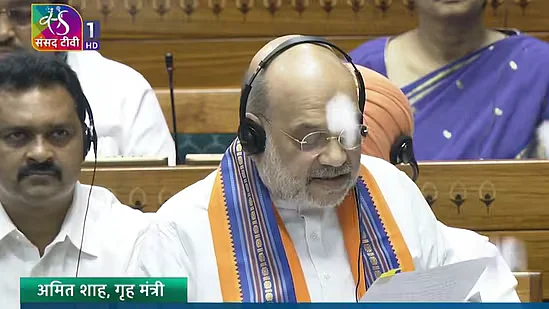Whether Attorney General of India K K Venugopal will give sanction for the prosecution for contempt of those who attacked and insulted Justice Surya Kant of the Supreme Court, for his comments on July 1 against dismissed BJP spokesperson Nupur Sharma, remains to be seen. Saket Gokhale, the national spokesperson for the Trinamool Congress Party, sent a letter dated July 3 to the A-G seeking permission to prosecute Op-India and its editor, Nupur J Sharma, for scandalising the judiciary and allegedly obstructing the delivery of justice by her vituperative comments.
But whether the A-G grants this sanction to prosecute Nupur Sharma and those who support her for contempt is a million dollar question. This is because the AG takes instructions from the Modi government which may not want to punish Nupur Sharma and her supporters who attacked Justice Surya Kant for observing :”Is she (Nupur Sharma) getting threats or is she a threat to others ? She has single-handedly set the whole country on fire.” Amid the subsequent ruckus, those with an agenda to support Nupur Sharma forget that oral observations are not binding – only orders dictated in court must be complied with.
Contrast these oral observations with those made in the judgment delivered in the Teesta Setalvad case. Setalvad’s name figures in the cause title of the petition and the scathing observations in the verdict against those activists who “sit in air-conditioned rooms” and “want to keep the pot boiling” culminated in the arrest of this journalist. The judges disbelieved the testimony of IPS officers, one of whom has expired. Retired judges have commented that the bench transgressed judicial rectitude by defaming a dead IPS officer while disbelieving his testimony. The judges could have clarified that they did not imply that Teesta Setalvad should have been arrested, but they chose to maintain a deafening silence.
Those who have an agenda to pursue have now started to threaten judges of the Supreme Court for their oral observations. Justice H P Sandesh of the Karnataka high court was threatened with a transfer because he observed that the Karnataka Anti Corruption Bureau had become a “collection centre” for bribes. Chief Justice Sanjib Banerjee, who observed in court that the Election Commission should face murder charges for holding elections during the Covid pandemic, was shunted in January 2021 to the tiny Meghalaya High Court as a punishment.
Unlike Mahua Moitra who declared she had no qualms in worshipping a meat-eating, alcohol-accepting Kali Maa, these judges have the total freedom to make strong oral observations during arguments in court, because we follow an adversarial and not an inquisitorial system. By punishing such upright judges, the collegium may be seen as bending to public opinion when it should not do so.
The petitioners who seek to expunge the oral remarks of Justice Surya Kant against Nupur Sharma are unaware that oral remarks cannot be expunged because, unlike Parliament and the state legislative assemblies, courts do not record such statements. Only signed and written orders are subject to judicial review. What is more sinister is these petitioners who want these oral observations to be expunged and action taken against Justice Surya Kant are obstructing the judiciary from delivering justice. The government may become a party to such sinister designs if it does not sanction the prosecution of Nupur Sharma and her alleged accomplices for contempt.
These so-called distinguished retired judges, bureaucrats, and retired officers of the armed forces have pressurised the judiciary by alleging that Justice Surya Kant’s remarks “surpassed the Laxman Rekha” while hearing the former BJP spokesperson’s plea to club all the FIRs filed against her in various states. The letter was signed by 15 retired judges, 77 retired bureaucrats and 25 retired officers from the armed forces against Justices Suryakant and S B Pardiwala who heard the Nupur Sharma plea.
Judges of the high courts and Supreme Court cannot identify themselves with any religion simply because they transcend all personal and religious beliefs when they take an oath to uphold the Constitution. Hence, their only religion is the Constitution – although they are free to practice, profess or propagate any religion of their choice when they exit their courtrooms. For judges discharge judicial functions only inside their their courts and nowhere else.
To imply that judges are bound by public opinion is a heinous crime because people form their opinions from various sources. These are predominantly the media, which is composed of a heterogeneous mix of news channels and newspapers, each professing different ideologies. People are also influenced by their religious beliefs and traditions, which find no place inside a court room. It is true that judges have their own inclinations like other human beings, but by their training and experience they are mandated to minimise their biases.
Unlike the USA, where judges are either Democrats or Republicans depending upon which President of that country appointed them, Indian judges are not supposed to keep the religious identity of a litigant in mind while delivering justice. If they do so, this itself is grave injustice. That is why the collegium of the apex court is supposed to study the judgments of each chief justice carefully before elevating him or her. Whether they do so in reality is questionable.
This does not imply that the judges of our apex court are not vulnerable to pressure from the executive which may be one reason why it was reported that none of the judges signed the judgment delivered in the Ram Janmabhoomi-Babri Masjid dispute. This itself is astounding because if a judge does not sign his judgment, he renders it non est which means it is null and void from a legal perspective.
In 2021, one Waseem Rizvi filed a petition in the Supreme Court seeking the deletion of 26 verses in the holy Quran. Rizvi seemed astoundingly ignorant of the fact that the Supreme Court has its limitations, one of which is it cannot delete the verses in any sacred religious text – whether it is the Quran, Bible, Bhagwad Gita or the Zend Avesta. Quite rightly, the Supreme Court imposed punitive costs of Rs 50,000 on Rizvi. In 1984, a similar misconceived petition was filed in the Calcutta High Court which was also dismissed with costs.
The Supreme Court is supreme not because it is infallible but because it is final. This is why Nupur Sharma’s supporters must allow the judges to say what they want inside the court.
(Olav Albuquerque holds a Ph.D in law and is a senior journalist-cum-advocate of the Bombay High Court)










